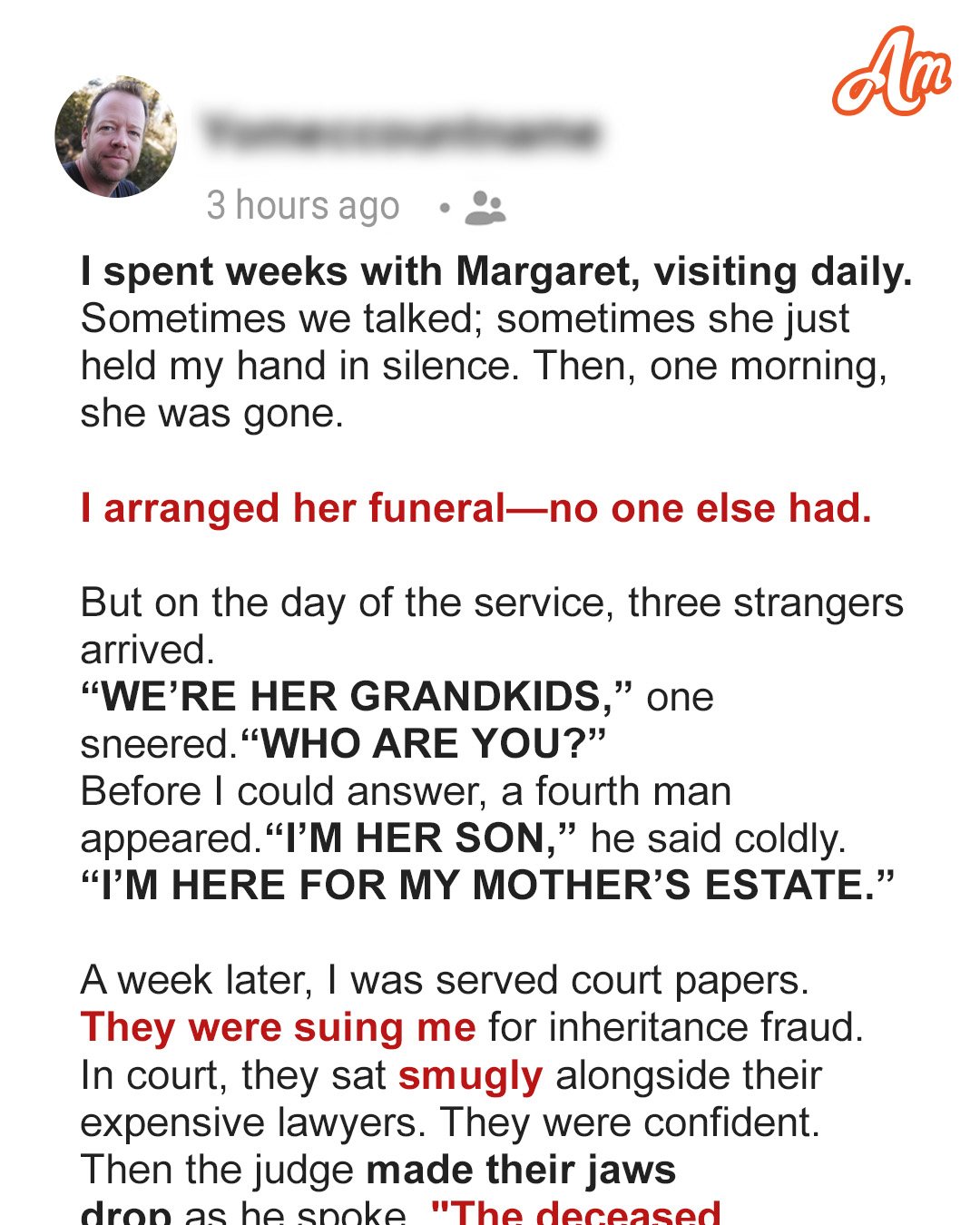
When Marcus picked up a mysterious elderly woman on his last shift of the night, her wistful request for a long drive through memory-filled streets tugged at his heart. He thought it was just a kind gesture — until weeks later, when he found himself in a courtroom battle that could ruin his life.
It was late in the evening when I decided to call it a night. My eyes felt heavy, and thoughts of Sarah and the kids tugged at my heart.
They always asked why I worked so late, and I never had a good answer beyond “bills don’t pay themselves.”
I switched off my taxi’s availability status and was about to put the car in drive when my phone chirped. One last ride request.
“Not tonight,” I muttered, reaching to decline. But something made me pause.
The address was only ten minutes away, in one of those older neighborhoods where Victorian houses lined quiet streets.
One last ride, one last fare, and the pickup point was so close… it didn’t make sense not to take it. Much as I wanted to get home, every dollar made a difference.
I accepted the request and pulled out into the evening traffic.
Minutes later, I pulled up to a dark house with ivy climbing its walls and peeling paint that had probably once been white. No lights were on. I honked my horn, but there was no movement inside. I double-checked the address — this was it.
“Come on, Marcus,” I told myself. “Just go home.”
But that nagging feeling wouldn’t leave. With a sigh, I put the car in park, walked up to the front door, and knocked.
A frail voice called from inside, “Just a minute!”
I heard something heavy being dragged across the floor, slow and methodical. My fingers drummed nervously on the doorframe.
When the door finally creaked open, I found myself face to face not with danger, but with a tiny woman who couldn’t have been less than ninety.
She wore a pale blue pillbox hat that looked like it came straight from the 1960s and a floral print dress that matched the era. A pearl necklace gleamed softly around her neck.
Behind her, the house seemed frozen in time. White sheets draped the furniture like ghosts, and the walls were bare except for faded patches where pictures had once hung.
In the corner sat a cardboard box overflowing with old photographs, their edges worn soft with handling. The air inside smelled of lavender and memories.
“Would you carry my bag out to the car?” she asked, gesturing to a small, well-worn suitcase.
“Of course. Happy to help.” I grabbed the bag, surprised by its lightness, and offered her my arm.
She took it with surprising grace, as if we were about to waltz instead of navigate her creaky porch steps.
“Watch that third step,” she warned. “It’s been loose since 1982. Frank always meant to fix it, but you know how husbands are with their to-do lists.”
Once we were settled in the taxi, she gave me an address, then hesitated. “Would you mind taking the long way? Through downtown?”
I glanced at the clock. “It’s not the shortest way.”
“Oh, I don’t mind,” she said softly. “I’m in no hurry. I’m on my way to hospice.”
My heart clenched. In the rearview mirror, I caught her eyes glistening with unshed tears. The streetlights caught the silver in her hair, making it shine like starlight.
“I don’t have any family left,” she continued, smoothing her dress with trembling hands. “The doctor says I don’t have very long.”
Only a person with a heart of ice could’ve refused her request, and I was not that kind of man. I shut off the meter and glanced at her over my shoulder.
“Which route would you like to take?”
For the next two hours, we drove through the sleeping city while she shared her life story.
The elderly woman had worked as a secretary at the old Thompson Building for 30 years. She showed me the tiny house where she’d lived with her husband Frank until he passed away 15 years ago.
“We saved for seven years to buy that house,” she said, a soft smile on her face as she stared out the window. “Everyone said we were crazy to want such a small place, but it was perfect for us. See the tall oak in the back? Frank built the kids a treehouse in it.”
When we passed a crumbling warehouse, she asked me to slow down. Her eyes lit up as she stared at the building.
“This used to be a ballroom… it’s where I met my husband,” she said, her voice warm with memory. “He stepped on my dress during our first dance. I thought he was a clumsy fool.”
I couldn’t help smiling. “And did he prove you wrong?”
“Oh no, he was clumsy to the end. But he was my clumsy fool.” She laughed softly, then grew quiet. “We danced here every anniversary until they tore the place down.”
We sat there a moment, staring at the old warehouse which was once a ballroom.
My heart pained for the world she’d lost, the places where she’d made precious memories that time had changed forever. She let out a deep sigh, and I turned to look at her.
“Thank you for doing this for me… I don’t even know your name.”
“It’s Marcus,” I replied.
She smiled. “My name is Margaret. Thank you for taking me to see these places one last time, Marcus, but I’m tired now. Let’s go to the hospice.”
As dawn painted the sky, I drove her to the address she’d given me. Two orderlies came out with a wheelchair as we pulled up. When Margaret tried to pay me, I shook my head.
“But you have to make a living,” she protested, her purse open on her lap.
“There are other passengers.” I helped her out of the car, and she surprised me by wrapping her frail arms around me in a hug.
“You gave an old woman a little joy tonight,” she whispered. “Thank you, Marcus.”
month later, my dispatcher called to say my car had been requested at the same hospice where I dropped Margaret off. When I arrived, I found a man in an expensive suit waiting at the curb.
“Marcus?” he asked. “I’m Margaret’s attorney. She requested to see you before she passes.”
He led me down a quiet hallway to a dimly lit room where Margaret lay in bed, looking smaller than ever. Her fingers were cold when she gripped my hand.
“I knew you’d come,” she said. “I don’t have much time, so listen carefully.”
Her lawyer opened a folder while Margaret explained she was leaving me her house and life savings of around $100,000.
“Margaret, I can’t accept this,” I stammered.
“Yes, you can.” Her voice grew firm, and for a moment I saw the strength that had carried her through 90 years. “For 20 years, my family forgot I existed. No calls. No visits. Nothing. You treated me like a person. You saw me.”
I visited Margaret every day until she passed peacefully in her sleep. When no family showed up to claim her, I arranged her funeral.
But on the day of the service, three strangers appeared, dressed in black, their faces pinched with anger.
“We’re her grandkids,” one of them scoffed. “Who are you?”
A fourth man stepped forward, his face hard as granite. “And I’m her son. I’m here to settle my mother’s estate.”
My stomach turned at their sudden interest in Margaret, but I stayed silent. A week later, court papers arrived at my door.
The family’s expensive lawyers accused me of manipulation and inheritance fraud. They sat smugly in court, certain of victory. But Margaret had anticipated everything.
“The deceased recorded a statement to be played now,” the judge announced.
The courtroom fell silent as Margaret’s face appeared on screen, tired but determined.
“To my so-called family,” she began, “I waited for you. I hoped I might see you all one last time. But you ignored me for 20 years. No birthdays. No holidays. Nothing. You don’t get to profit from neglect.”
Her son scoffed, but Margaret leaned closer to the camera, her eyes fierce. “I was of sound mind when I changed my will. Every doctor confirmed it. Every paper is signed. And if you dare claim I was manipulated, ask yourselves why a stranger treated me with more kindness in one night than you did in 20 years.”
The judge dismissed the case immediately, citing Margaret’s clear intent and thorough documentation.
Standing outside the courthouse, I felt the weight of the past few months settling in. Margaret had won. After decades of silence, she’d finally made herself heard.
That night, I took my family to the park after dinner, and we watched the sunset together.
I promised myself I’d honor Margaret’s memory, not just by keeping her gifts, but by treating every passenger with the same kindness I’d shown her that night.
Here’s another story: Fired for helping a confused elderly man with dementia who believed his sneakers were “running away,” I thought my compassion had cost me everything. But when the head nurse claimed my actions as her own, those runaway shoes unraveled her lies in the most unexpected way.
This work is inspired by real events and people, but it has been fictionalized for creative purposes. Names, characters, and details have been changed to protect privacy and enhance the narrative. Any resemblance to actual persons, living or dead, or actual events is purely coincidental and not intended by the author.
The author and publisher make no claims to the accuracy of events or the portrayal of characters and are not liable for any misinterpretation. This story is provided “as is,” and any opinions expressed are those of the characters and do not reflect the views of the author or publisher.





